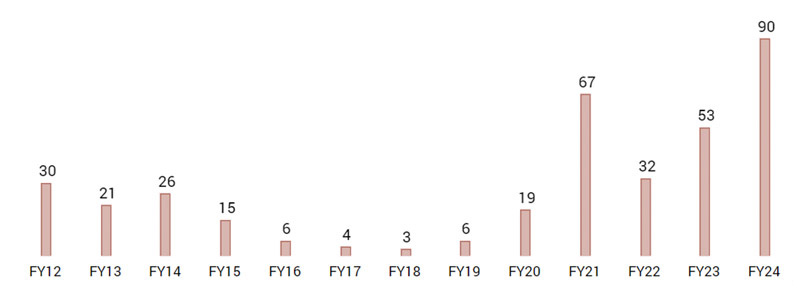In November 2023, the Australian Government introduced a new policy requiring NABERS Energy ratings to be displayed in its hotel booking system.
Hotel industry leaders have hailed this policy as transformative, anticipating a swift boost in energy efficiency across the accommodation sector, leading to similar gains seen in the Australian office sector
A transformative trajectory
From 1 July 2024, Australian Government employees are required to consider NABERS Energy rating when booking hotels. This new policy is a part of the broader Net Zero in Government Operations Strategy which aims to cut the Australian Public Service’s emissions to net zero by 2030.
Launching the strategy, federal Assistant Minister for Climate Change Jenny McAllister said the approach would change the way the Australian Government ran properties and conducted business. “By setting energy performance standards, we can drive down energy use and emissions,” she said.
The policy’s implementation aligns government procurement with sustainable practices, encouraging hotel owners and operators to enhance the energy efficiency of their assets. Employees are expected to “consider” a hotel’s NABERS rating now. With minimum standards likely to be set by 2026-27, hotel owners have new motivation to improve their ratings and make sustainability a core factor in their business strategies.
NABERS is one of the first sustainability certifications compliant with the international Travalyst criteria, and it will allow hotel owners to display their NABERS ratings on room booking platforms.
Hotels reach for the stars
NABERS is a common language that compares the energy and water efficiency of hotels of all shapes and sizes.
The NABERS assessment process considers each hotel’s unique characteristics, such as postcode, pool size, quality star rating, and number of guest rooms. Two hotels with identical NABERS ratings may have different energy consumption levels based on their operational context. However, NABERS ratings encourage meaningful improvements over time by providing a fair comparison between hotels with similar attributes.
NABERS ratings for hotel energy and water consumption have been available since 2009, but momentum slowed as the sector suffered during the pandemic. A rebound in activity has translated into a resurgence of NABERS ratings.
Over FY24, 90 Australian hotels received a NABERS Energy or Water rating – a remarkable 82% increase from the last financial year. The average 4.3-star NABERS Energy rating is an impressive indicator of sector leadership. The number of hotel ratings that achieved 5 stars or above has more than doubled when compared to the previous financial year, marking a significant surge energy performance and commitment to excellence across this sector,
Figure 1: Number of certified ratings for NABERS Hotel Energy FY12 – FY24

Leadership lessons
Integrating NABERS ratings into its investment strategies is driving substantial environmental and financial benefits for Pro-invest Group.
Since launching the first Pro-invest Australia Hospitality Opportunity Fund in 2016, Pro-invest has made energy efficiency a cornerstone of its hotel investments. The group's portfolio includes 12 NABERS-rated hotels, with two more soon to be added after reaching 12 months of operation.
Among Pro-invest’s assets is the Holiday Inn Express Southbank Melbourne, which attracted $78 million of construction debt, $39 million each from joint lenders Commonwealth Bank of Australia and the Clean Energy Finance Corporation (CEFC). The CEFC debt facility was subject to an undertaking that the hotel was designed and constructed to achieve a NABERS Energy rating of at least 5 stars (excluding Green Power).
“There are approximately 6,269 hotels in Australia and around 90 have NABERS ratings – around 1.4%. Pro-invest has 12 of those, and soon we will have 14. We think this is a powerful market advantage,” says Anthony Ursino, Pro-invest Group’s General Counsel and Chief Compliance Officer for Asia Pacific.
Pro-invest’s commitment to sustainability, outlined in its ESG strategy One Earth, Countless Experiences, includes a 2030 net zero carbon emissions goal for all Asia Pacific hotels.
“Every company can roll out an ESG policy. But how do you substantiate your claims? NABERS allows us to do that.”
The federal government’s new net zero policy change is a “game changer” and Pro-invest is confident it is positioned ahead of the curve, Anthony adds.
“Our founders had the foresight to push for NABERS because we saw what happened in the office market and knew it was only a matter of time for hotels. We expect many ‘epiphany moments’ in the next few years.
“Given the journey we are all on to report Scope 3 emissions, we expect to see more corporations using NABERS as a benchmark in their requests for proposal. Eventually, a NABERS rating will be an essential budget item, and energy efficiency an essential business function like accounting or marketing.”

Image: The Holiday Inn Express Melbourne, Southbank
The road ahead
Looking ahead, NABERS continues to enhance its support for hotel operators on their sustainability journeys. The NABERS team has worked hard over FY24 to streamline the rating process for hotel operators, launching a state-of-the-art online platform, NABERS Perform which provides a more seamless experience.
In addition, rating reports have been updated to deliver more granular and meaningful information, empowering operators to make better decisions. Serviced apartments are also more accurately addressed in the NABERS rating process.
Where is the trendline pointing?
Melinda Dewsnap, Manager of Sustainability Programs for the City of Sydney, works closely with hotel operators, event centres, cultural institutions and tourism bodies as part of the Sustainable Destination Partnership, and is optimistic about the future of the sector.
Melbourne, Sydney and Brisbane are already rated among the top 40 cities for sustainable destination management, according to the globally-recognised GDS-Index.
“NABERS ratings not only strengthen trust and transparency in building performance, but they also align with growing visitor demands for sustainability. As global event attraction becomes increasingly dependent on demonstrating effective sustainability practices, NABERS is pivotal in meeting and communicating these expectations.”
